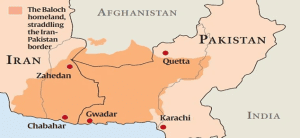Table of Contents
THE CONTEXT: Recently, Baloch separatists armed with guns and bombs attacked Pakistan’s strategic Gwadar port, key to the multi-billion-dollar China-Pakistan Economic Corridor. Pakistan security forces restrained the complex coordinated attack on Gwadar Port Authority Complex in a two-hour-long battle and claimed to have neutralised all eight militants.
WHO ARE THE MAJEED BRIGADE?
- The Majeed Brigade of the Balochistan Liberation Army (BLA), claimed responsibility for the attack, stressed that their fighters had targeted Pakistan’s Inter-Services Intelligence (ISI) and Military Intelligence facilities.
- The Baloch Liberation Army (BLA) is the most prominent of the many separatist groups in Pakistan’s restive Balochistan province.
- The Majeed Brigade, which has been active since 2011, is the BLA’s dedicated suicide squad. The unit is named after two brothers, both of whom were called Majeed Langove.
- The Majeed Brigade is well-armed and possesses high-grade weapons, including improvised explosive devices (IED), anti-personnel and anti-tank mines, grenades, rocket-propelled grenades (RPGs) and various automatic weapons.
- Although the Majeed Brigade is fast becoming a more lethal arm of the BLA, being a BLA member is not a prerequisite to join the Majeed Brigade. Insurgents from other Baluch separatist organizations who volunteer for suicide terrorism can join the Majeed Brigade.
ISSUES:
- Troubled relations of neighbours with Pakistan: Apart from serious domestic troubles on security, Pakistan does not enjoy good relations with most of its neighbours at the moment. The growing infrastructure for violence in the country does not goes well for the region.
- Baloch insurgency: The Baloch insurgency in Pakistan has been gaining momentum for the past two years and insurgents regularly breach the security of Pakistani military and paramilitary installations across the country. The Gwadar incident is yet another big attack that points to the growing capability of armed Baloch groups.
- Economic Disparities: The Baloch homeland is rich in natural resources, but economic disparities persist. In Iran, a significant portion of the Baloch population lives under the poverty
- Issues faced in Balochistan: Apart from economic deprivation and lack of political freedom, the burning issues in Balochistan have been the forced disappearances of thousands of men and extrajudicial killings of many of those reported missing.
- Importance of Gwadar port: Balochistan and the Gwadar port are immensely important for Pakistan, especially for the army that has taken on the responsibility of making the China-Pakistan Economic Corridor (CPEC) and its end port, Gwadar, a success story for China’s Belt and Road Initiative.
- Chinese issues: The Chinese though for now continue holding the hand of the “all-weather ally” with respect to moving forward on CPEC and Gwadar port. However, in the larger scheme of things in the Indian Ocean region, given the grave security imperatives for Pakistan, the Gwadar port may not be able to compete with the Iranian port of Chabahar for business and trade.
- Security Concerns: Escalating tensions may raise security concerns for neighbouring countries, particularly India and Afghanistan. The region is already filled with security challenges, and heightened tensions could worsen the situation.

THE WAY FORWARD:
- Counterterrorism Cooperation: Pakistan’s political and economic situation can provide an opportunity for India to engage with the international community in addressing the issue of cross-border terrorism. India can strengthen its case for global cooperation in combating terrorism and isolating state-sponsored terror networks.
- Change in foreign policy: India as a rising power with growing economic and security interests in the region, needs to rethink its traditional neutrality and passive approach in the Middle East and Central Asia.
- Regional Power Projection: The border clashes between Iran and Pakistan must not be allowed to escalate as it will create another war frontier in Asia. Start of war in this region could not only hamper peace, it may further create economic problems for the whole world.
- Strengthening Regional Connectivity: India can capitalize on Pakistan’s current challenges by promoting regional connectivity initiatives, such as the Chabahar port in Iran or the International North-South Transport Corridor (INSTC). These projects can bolster India’s access to Central Asia, Afghanistan, and beyond, enabling trade diversification and enhancing India’s regional influence.
- Economic Cooperation with Other Countries: India can position itself as a stable and attractive investment destination in the region. With Pakistan facing economic challenges, India can leverage its economic growth and stability to attract foreign direct investment (FDI) and foster closer economic ties with other nations.
THE CONCLUSION:
The implications of escalating tensions in the region are multifaceted and extend beyond bilateral relations. The situation has the potential to impact regional stability, security dynamics, and the broader geopolitical landscape in the region. Diplomatic efforts and de-escalation measures is crucial to mitigate the risks and prevent further deterioration of the situation.
UPSC PREVIOUS YEAR QUESTIONS
Q.1 Peace in the Indian subcontinent presupposes amity between India and Pakistan. Examine. (2018)
Q.2 In what ways would the ongoing U.S-Iran Nuclear Pact Controversy affect the national interest of India? How should India respond to this situation? (2018)
MAINS PRACTICE QUESTION
Q.1 The implications of escalating tensions in the region due to Baloch attacks on Gwadar Port are multifaceted and extend beyond bilateral relations. Comment.
Spread the Word